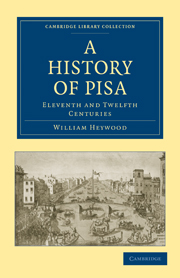Book contents
- Frontmatter
- BIOGRAPHICAL NOTE
- PREFACE
- Contents
- LIST OF PLATES
- I A FLOATING REPUBLIC
- II THE EXPULSION OF MOGAHID FROM SARDINIA
- III THE EXPEDITIONS AGAINST PALERMO AND MEHDIA
- IV THE FIRST CRUSADE
- V THE BALEARIC EXPEDITION
- VI WAR WITH GENOA
- VII THE WAR WITH THE NORMANS
- VIII INTO THE VORTEX
- IX PISAN COLONIES
- X FREDERICK BARBAROSSA
- XI EXPULSION OF THE GENOESE FROM CONSTANTINOPLE
- XII BARISONE OF ARBOREA
- XIII RAINALD OF COLOGNE
- XIV GENOA AND LUCCA AGAINST PISA
- XV CHRISTIAN OF MAYENCE
- XVI THE COMMUNES DEPRIVED OF THEIR CONTADI
- XVII PISA AND THE EMPEROR HENRY VI
- XVIII ‘THE GREAT REFUSAL’
- XIX PISA UNDER THE GOVERNMENT OF THE CONSULS
- XX CONSORTERIE GENTILIZIE
- XXI FROM CONSULS TO POTESTA
- BIBLIOGRAPHICAL APPENDIX
- INDEX
- Plate section
XXI - FROM CONSULS TO POTESTA
Published online by Cambridge University Press: 05 July 2011
- Frontmatter
- BIOGRAPHICAL NOTE
- PREFACE
- Contents
- LIST OF PLATES
- I A FLOATING REPUBLIC
- II THE EXPULSION OF MOGAHID FROM SARDINIA
- III THE EXPEDITIONS AGAINST PALERMO AND MEHDIA
- IV THE FIRST CRUSADE
- V THE BALEARIC EXPEDITION
- VI WAR WITH GENOA
- VII THE WAR WITH THE NORMANS
- VIII INTO THE VORTEX
- IX PISAN COLONIES
- X FREDERICK BARBAROSSA
- XI EXPULSION OF THE GENOESE FROM CONSTANTINOPLE
- XII BARISONE OF ARBOREA
- XIII RAINALD OF COLOGNE
- XIV GENOA AND LUCCA AGAINST PISA
- XV CHRISTIAN OF MAYENCE
- XVI THE COMMUNES DEPRIVED OF THEIR CONTADI
- XVII PISA AND THE EMPEROR HENRY VI
- XVIII ‘THE GREAT REFUSAL’
- XIX PISA UNDER THE GOVERNMENT OF THE CONSULS
- XX CONSORTERIE GENTILIZIE
- XXI FROM CONSULS TO POTESTA
- BIBLIOGRAPHICAL APPENDIX
- INDEX
- Plate section
Summary
As the century grew older, the associated families which constituted the Commune gradually ceased to be the natural and inevitable representatives of their fellow-citizens. The merchants on terra firma, the Arti, the landed proprietors, had other ideals and other aspirations than those of the sea-captains and armatori; and, little by little, even the holy of holies of the Consulship was, as we have seen, invaded by men of a different class. Having lost its homogeneity, the ruling aristocracy was torn by conflicting interests; and, in order to enable the Consular College to govern at all, it seems to have become necessary to elect a president or “primus consul,” a kind of ἄρχων ἐπώνυμος, invested with authority to take action on his own initiative in the name of his colleagues. In time of war, one, and rarely more than one, of the Consuls was appointed head of the army, and exercised almost unlimited jurisdiction both within and without the city; the numbers of the College tended to decrease; and the way was opened for the coming of the Potestk. Meanwhile, the great feudal families of the contado began to aspire to a share in the government; and, after the descent of Barbarossa into Italy, we find the Gherardesca taking an everincreasing part in public affairs.
- Type
- Chapter
- Information
- A History of PisaEleventh and Twelfth Centuries, pp. 262 - 269Publisher: Cambridge University PressPrint publication year: 2010First published in: 1921



